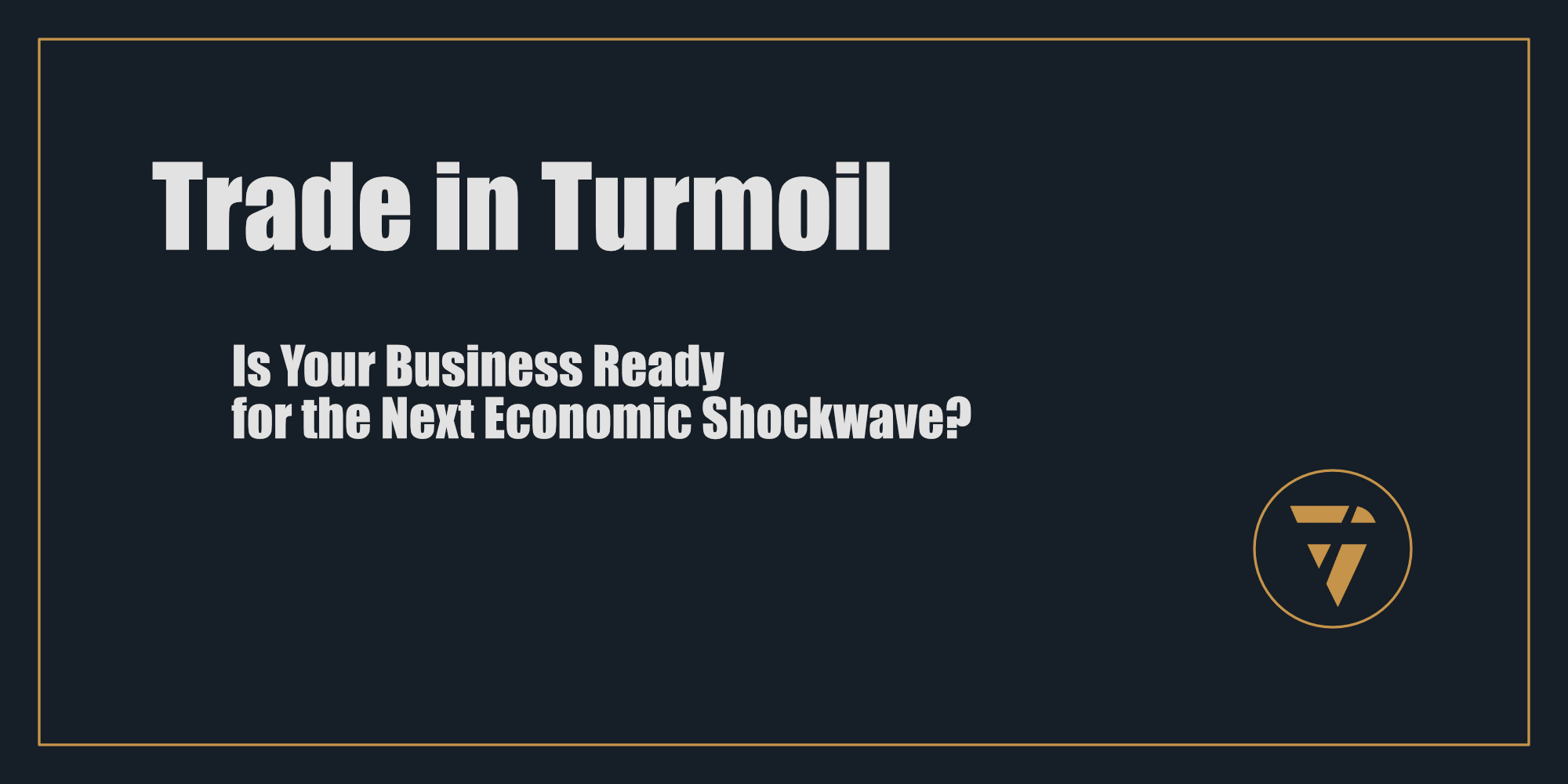Trade in Turmoil

Is Your Business Ready for the Next Economic Shockwave?
For decades, businesses operated under a single assumption: that global trade was stable, predictable, and constantly expanding. Supply chains stretched across continents, production costs were kept low through outsourcing, and financial markets provided easy access to credit and capital. Growth was built on efficiency, just-in-time logistics, and the idea that political and economic conditions would remain steady enough for long-term planning.
That world is gone.
Trade has become a weapon. The battle for control over supply chains, resources, and financial systems is disrupting entire industries. Countries are using tariffs, sanctions, and export restrictions as geopolitical leverage. Currencies are fluctuating wildly, inflation is eroding profitability, and businesses that once relied on smooth global operations are finding themselves caught in economic crossfire. The rules of international trade are no longer being written in boardrooms or diplomatic meetings; they are being shaped by economic warfare, regional instability, and shifting alliances.
The shockwaves are already being felt. The United States is locking into a series of erratic economic confrontations that are forcing companies to rethink their supply chains. The European Union is struggling with rising debt, inflation, and energy security concerns. Trade routes through the Red Sea and other key chokepoints are under threat from conflict and geopolitical tensions. Major economies are turning inward, focusing on domestic resilience instead of global expansion.
This is not a temporary disruption. This is the new normal.
Businesses that fail to recognize the scale of this transformation will not survive. Those that take decisive action—restructuring supply chains, diversifying markets, and securing financial resilience—will emerge as the dominant forces of the next era. This is the moment where leaders separate from followers, where strategy becomes the difference between survival and collapse.
The next economic shockwave is coming. The only question is whether your business is prepared for it.
The Breakdown of Global Trade
For much of the last century, globalization was built on a core assumption: that economic interdependence would prevent large-scale disruptions. Nations benefited from free trade agreements, corporations thrived on outsourcing and offshoring, and financial markets rewarded companies that maximized efficiency.
That assumption has been shattered. The global economy is no longer driven by co-operation—it is driven by competition, conflict, and national security concerns.
The U.S. war on the world has gone far beyond tariffs.
Washington has placed severe restrictions on technology exports, crippling China’s access to advanced semiconductor chips and AI development. Beijing has responded by cutting off critical rare earth mineral exports, threatening global production of batteries, electronics, and renewable energy components. Businesses that relied on stable trade between these two giants are now being forced to rethink their entire operating models.
The European Union, once a stronghold of economic stability, is facing internal fractures. Energy prices remain volatile following Russia’s invasion of Ukraine, inflation is eroding consumer spending power, and industrial production is declining. Germany, long the economic engine of Europe, is struggling with supply chain issues and a shrinking manufacturing base. France is grappling with rising political instability and protests that disrupt trade and infrastructure.
Key global trade routes are becoming war zones. The Red Sea, a vital corridor for shipping between Asia and Europe, has become increasingly dangerous due to attacks on commercial vessels. The Panama Canal, essential for connecting the Atlantic and Pacific, is facing record-low water levels, delaying shipments and driving up costs, and now, war with the US to hold it. Even the Arctic, once an afterthought in global trade, is becoming a contested zone as melting ice opens up new shipping lanes controlled by Russia and China and the US attempts to acquire Greenland.
Trade is no longer a neutral force—it is a battlefield. And every business must decide how to navigate it.
The Death of Just-in-Time and the Rise of Supply Chain Resilience
For years, businesses optimized their supply chains for efficiency, minimizing costs through just-in-time inventory systems and single-source suppliers. That model worked in a world where logistics were stable and disruptions were rare. But in today’s reality, just-in-time means just-in-trouble.
The pandemic exposed the fragility of global supply chains, with shortages of essential goods ranging from semiconductors to pharmaceuticals. But instead of recovering, supply chains have only grown more volatile. Companies that once depended on Chinese manufacturing are now scrambling to shift production to India, Vietnam, and Mexico. Western governments are offering massive subsidies to bring production home, but reshoring is expensive and slow. The companies that move first—securing multiple supply sources and building in redundancy—will outlast those still clinging to outdated cost-saving measures.
Energy dependency is another critical weakness. Europe’s reliance on Russian natural gas left it exposed when Moscow weaponized energy supplies in response to Western sanctions. Now, businesses are being forced to secure alternative energy sources, whether through renewable investments, LNG imports, or nuclear expansion.
Companies that treat supply chain security as an afterthought will be left behind. Those that make it a core part of their strategy will define the next economic era.
The Currency Wars and Financial Shocks Ahead
Trade is not just about goods—it's about money. And the global financial system is becoming just as unstable as supply chains.
The U.S. dollar, long the backbone of international trade, is under pressure. I think it's done. The BRICS nations—Brazil, Russia, India, China, and South Africa—are working to reduce their reliance on the dollar, using alternative currencies and payment systems. Saudi Arabia and the UAE have begun conducting oil sales in Chinese yuan. Russia and China are developing their own banking networks to bypass Western financial sanctions. How does Canada function in a world without the dollar Mr. Carney? It's an interesting conversation we are going to be forced to have.
Interest rates remain high, making debt more expensive and limiting corporate expansion. Inflation is still eroding profitability, forcing businesses to raise prices or cut costs. Stock markets remain unpredictable, with economic downturns in key regions affecting global investment flows.
The companies that will survive are those that hedge against financial instability—diversifying currency exposure, locking in long-term contracts, and securing access to reliable financing. Those that fail to plan will be caught in the storm with no shelter.
How Businesses Can Prepare for the Next Shockwave
Adaptation is no longer optional—it is the cost of survival. Companies that want to thrive in this new era must take immediate action.
Diversifying trade partnerships is critical. Businesses that rely on a single country for supplies or sales are putting themselves at risk. Expanding into emerging markets, building relationships with suppliers across multiple regions, and securing alternative logistics routes will be essential.
Investing in supply chain resilience must be a top priority. Companies need to shift from just-in-time to just-in-case, maintaining critical inventory buffers, securing backup suppliers, and exploring nearshoring or regional production to reduce exposure to global disruptions.
Financial agility is more important than ever. Companies must protect themselves from currency fluctuations, inflation, and interest rate shocks. This means hedging currency risk, securing long-term financing at fixed rates, and ensuring financial flexibility in times of crisis.
Technology will be a defining factor. Businesses that leverage AI for supply chain management, use blockchain for secure transactions, and integrate digital trade platforms will have an edge over those still operating with outdated systems.
The next economic shockwave is already forming. The businesses that survive will be those that take control of their own fate—building resilience, adapting to change, and positioning themselves as leaders in the new world order.
The question is no longer whether disruption is coming. It is already here.
The only question that remains is whether your business is ready for what comes next.
This is what I’m working on. Tell me what you think, I enjoy the conversation! Subscribe and follow the work in real time.
Thanks!
B

Trade is no longer a neutral force, it’s a weapon. Is your business prepared for economic war?
PS -






